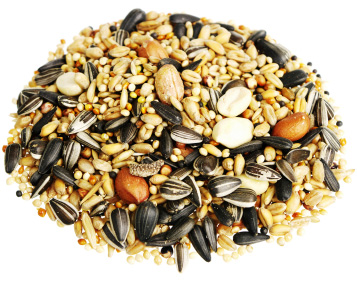THE NEW YORK TIMES
October 3, 1999
By Christopher S. Wren
What do 40,000 pounds of birdseed have in common with America’s war on drugs?
Nothing, says Jean Laprise, an Ontario farmer who shipped the birdseed to his American customers, only to have it seized when it crossed the U.S.-Canadian border.
Everything, say the U.S. government and its critics, but for altogether different reasons.
The birdseed, nearly 20 tons of it, has been locked in a Detroit warehouse since Aug. 9, when it was impounded by the U.S. Customs Service. The reason: the seed consists of sterilized seeds processed from industrial hemp.
Laprise has found himself mired in one of the more bizarre episodes of Washington’s campaign to curb illicit drug use. Hemp and marijuana are different varieties of the same plant species, Cannabis sativa, though the government rarely distinguishes between them.
“They say it’s a tractor-trailer full of drugs,” Laprise said. “We say it’s a tractor-trailer full of birdseed.”
But while smoking marijuana delivers a psychoactive high, smoking hemp gives only a headache. Tetrahydrocannabinol, known as THC, the psychoactive component in marijuana, usually varies between 4 and 20 percent of a leaf. Industrial hemp has a THC below 1 percent.
The birdseed seized in Detroit had a THC content of barely 0.0014 percent, which wouldn’t give a bird a buzz.
John W. Roulac, the president of Nutiva, a company in Sebastapol, Calif., that buys hemp seeds from Laprise’s operation for food products, said that seeds themselves have no THC, and whatever gets detected comes from contact with leaves of the hemp plant.
Mr. Roulac said the amount of THC was “like an olive pit in a railroad boxcar.”
Mr. Laprise, whose company, Kenex Ltd., grows and processes hemp with the approval of the Canadian government, said that “all of our other products have no detectable level of THC. The only shipment with any detectable amount was the birdseed, and it was really nothing.”
Though the U.S. government today views hemp with suspicion, it was historically an agricultural staple used in everything from ropes and sails to clothing and the first American flag supposedly sewn by Betsy Ross. It has been virtually illegal since 1937.
Last year, Canada declared hemp a legitimate crop and has granted growers’ licenses for 35,000 acres. Britain, France and Germany also have commercial hemp industries. Hawaii, North Dakota and Minnesota passed laws approving hemp this year as a crop for hard-pressed farmers.
Kenex’s customers, who snap up Laprise’s hemp seeds and fibers for everything from food for animals and people to beauty products and horse bedding, have been outraged by the seizure in Detroit.
“What in the heck are they doing arresting birdseed?” said Anita Roddick, the British founder of the Body Shop, whose organic hair- and skin-care products have used hemp oil produced by Laprise.
“It’s so Monty Pythonesque,” Roddick said, referring to the antic comedians who mocked life’s absurdities. “They’re chasing around bloody birdseed. It’s making the DEA look stupid.”
Federal law enforcement officials defended the seizure. DEA spokesman Terry Parham said, “Our understanding is there is no legal way for hemp seed to have come in that contains any quantity of THC.” He explained that no product containing THC could be imported except by a company registered with the DEA, and that no companies are registered.
Drug-policy critics like Ethan Nadelmann, the president of the Lindesmith Center, a New York group that advocates a more liberal drug policy, reacted to the birdseed seizure with glee, contending that it show how dumb the war on drugs can get.
Mr. Laprise said the Customs Service also ordered him to recall his earlier exports to the United States of hemp oil, horse bedding, animal feed and granola bars, or face more than $400,000 in fines. He cannot comply, he said, because the products have been used or consumed.
Meanwhile, a report by the United States Department of Agriculture assessing the potential of hemp growing has made the rounds of the Federal Government. The report’s beige cover is tamped “Classified.”
I can’t figure out why they classified this,” said a Government official who let a reporter take a peek. The study said there was a limited nice market for hemp products like Mr. Laprise’s birdseed.
Related articles









